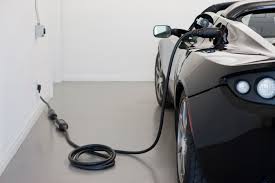German Car Makers Focus Attention on High-End Electric Vehicles
- 18/08/2015
- Transport
- Posted by Tessa Romarez
- Leave your thoughts
Car makers in Germany are now taking away their attention on low-priced city vehicles.
Instead, they are focused on manufacturing high-end electric vehicles – like the Audi R8 e-tron, for instance. Such change of heart is their contribution to the attempt of reviving the public’s interest in the environment-friendly but unnoticed zero-emission cars.
At a recent car presentation at Geneva, top car maker Audi presented its zero-emission version of the R8 model, priced at 165,000-euro or $184,619. This Audi car is capable of a 450-kilometre drive or 280 miles, before it finally needs to recharge. Audi recharging is done in a mere hours, or even less.
With its electric car revealed at the auto show, this means that Audi has decided to become a major player of the EV market. As it is, many car makers are in a quandary on whether to continue pursuing their EV manufacturing plans, since electric cars have somehow lost their popularity after the initial hype.
Indeed, the novelty of these battery-powered vehicles have lessened somewhat because of the issues that cropped up, like the lack of recharging stations and limited driving ranges. People continue to ignore the many benefits that it supposedly offer, like the improved condition of the environment and the generous incentives offered by the governments themselves.
Many consumers remain indifferent to EVs because of their high prices, brought about by special batteries, cabling, and other system.
Thus, choosing them over the traditional gas-fuelled car can be a difficult decision to make.
A popular car maker in the US is Tesla, which enjoys significant success with their plug-in vehicles. It produces EV models with prices starting at $77,000 dollars. The high price allows the manufacturer to use a large battery, a technique that proves to be not viable when apply to a low-priced vehicle. But with a battery bigger than what’s conventional, EVs can run over 400 kilometres in one charge. Small EVs will have to be contented with a shorter 100-kilometre range.
In Geneva, Daimler CEO Dieter Zetsche said one of the reasons his company’s electric cars had failed to gain traction was because they tended to lean toward the cheaper vehicle segment. “As proven by Tesla, there can be a market at the other side of the range as well. If that is a possibility, we are investigating,” Zetsche, Daimler CEO said. He hints that his company’s luxurious Mercedes Benz brand might work on its own electric limousine.
In order for electric vehicles to enjoy greater popularity and more acceptance from the public, the price of batteries has to go down to below $100 for every kilowatt hour, Ulrich Hackenberg, Audi head of research and development, explained to Reuters. On the other hand, analysts at Bernstein Research had given an estimate of the EV battery pack’s price at around $400 per kWh.
Analysts agree that Audi’s foray into making attractive and efficient high-end electric vehicles can become a trigger that will attract customers into the car maker’s showroom. Its major participation in the electric vehicle industry will lure more car makers into considering the making and selling of electric car.

